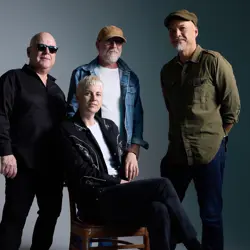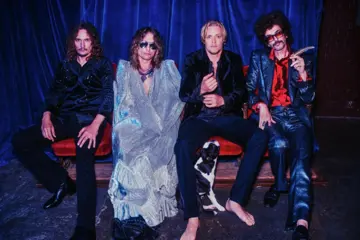 Pixies
PixiesThe legacy that the Pixies left on the history of rock'n'roll music during their initial tenure spanning the '80s and '90s is undeniable. The ongoing reunion tour that they'd been conducting on a massive scale since reforming in 2004, however, had to eventually result in some new music lest the entire thing lapse into an exercise in base nostalgia or, even worse, pastiche.
With that in mind in October 2012 the iconic four-piece – frontman and creative font Charles “Black Francis” Thompson, charismatic bassist/backing vocalist Kim Deal, guitarist Joey Santiago and drummer David Lovering – decamped to Rockfield Studios in Wales to lay down new material with former production flame Gil Norton for what would become their fifth studio album proper, and their first since 1991'a Trompe le Monde.
One night early in the piece the band dined together at a restaurant and randomly Deal picked up the tab – by all accounts a rare occurrence. Then the very next morning she approached her bandmates in a coffee shop near the studio and dropped the bombshell that she was flying home the following day – she was leaving the sessions without completing her bass parts, and for all intents and purposes quitting the band.
The impact was seismic and for a while the entire future of this massively influential band was at a crossroads. After a few days of mourning the remaining members offered a collective shrug, rolled up their sleeves and re-entered the fray in the studio. The result was the first album of the Pixies' second career phase, Indie Cindy, released somewhat unusually as a series of standalone EPs before last month's unveiling in conventional album form.
Don't miss a beat with our FREE daily newsletter
“There was obviously an element of surprise,” Santiago recalls of Deal's dramatic departure. “It came out of the blue, but the thing that derailed us was, 'Why did she leave?' And the other question was, 'What the hell are going to do?' But after a while, it became apparent that we had these half-finished songs when she left – these half-baked songs – and we had to finish them. But kudos to her.
“The four songs that we'd already tracked down and she'd finished the bass parts on, we ended up having to replace them for one reason or another – I don't know, some legal stuff – but the recording process surprisingly didn't end up changing that much. We had to lay down guitars and the vocals – that's it. That's what we do, so whether she hangs around or not we were going to do that anyway.
“It was an easy decision to keep going. At one time Charles was kicking around the idea – not me – of continuing this recording but changing our name, changing the project so that instead of the Pixies it was something else. I said, 'What's the point of that? We're still going to sound like the Pixies!' To my mind there was absolutely no point in doing that.”
The bass parts on Indie Cindy were eventually recorded by Simon “Dingo” Archer (The Fall, PJ Harvey), but Deal's role on stage was first filled briefly by Kim Shattuck (The Muffs) before passing to Paz Lenchantin (A Perfect Circle, Zwan) – both chosen clearly with a view of replicating Deal's integral female backing vocals in the live realm. Santiago is speaking to The Music from his LA home during a break from touring the new album – has it been strange for him looking over to the far side of stage and seeing a new face?
“In some way I've got to admit it's refreshing. It's a different vibe, and Paz is very fun to hang around with. She's very intelligent and she's fitted in very well with us. We feel revitalised, there's no other way to put it – we're like the phoenix rising. We were down, but now it's like a new rebirth. It's got to feel good, and we're still selling out shows – we've got four nights in Sydney, there's no problem,” he laughs heartily. “This new version is working.
“[The new material]'s been well received for the most part – it just proves that we're a real band. That's what real bands do – they record and they go on tour – so it feels really, really good. I'm really proud of [the new songs] and the audience is really starting to catch on – at first when the EPs were young people were clearly not used to the music but it evolves over time and now you can start to see people singing along with the new stuff and really liking it.
“It was high time and we had to do something. Beforehand we were happy enough and the fans were just expecting the nostalgic tour – in the first few years they didn't want to hear anything new yet – but after several years we started to think, 'Okay, for us it's time. We've been around the world three or four times, and now it's time to put out something new.'”
Surely it was daunting releasing new music after such a length layoff, given the esteem in which the Pixies' catalogue is held in the alternative world?
“We were initially quite precious about it, but after a while we just had to do it,” the guitarist concedes. “It's a great batch of songs, and we just stopped being precious about it – we can't relive the past, so we just had to forge ahead and do something different. Grow up a little bit. That's not to say that we won't revert back on the next album… not 'revert back', but it will probably be a more hard-hitting record.
“We're already planning on making another record, so I'm looking forward to that. I'm wondering what it's going to sound like – it's always a surprise when you go in the studio – you have these pre-conceived notions, but this time around we're going to stick to it. I really want a hard-hitting record this time around, everyone's hungry for that and I really want to do it.”
It's not really surprising that they're already looking forward to the next album: the Pixies' first tenure was remarkably prolific – yielding debut mini-album Come On Pilgrim and the first four long-players between 1987 and 1991 – and Thompson's solo alter-ego Frank Black also released plenty of material post the band's 1993 split.
“Yeah, the creative juices are always flowing – Charles has been prolific since the break-up – but I don't think I want to do an album a year,” Santiago offers. “These days I figure you can just roll with an album for a while, and sometimes I think that's kinda what we should have done when we were originally together. That's actually a good question – I wouldn't know why we had to do it once a year, I think maybe Charles wanted to do it or something? But it seemed natural. We like to keep it fresh.”
As always Black Francis did most of the heavy songwriting lifting on Indie Cindy, although Santiago attests that he was given free rein with his typically idiosyncratic guitar parts on the record.
“I did go to Charles' neighbourhood – all the way to the east coast – for about seven weeks just working on ideas,” he tells of the pre-production process. “I kind of started working on guitar parts that were to be either kept or not, and a lot of them did get kept – that's how the recording process started. I guess we reverted back to the old method.
“The guitar parts have to fit the songs – I really didn't have anything in my pocket to draw from when I got there, just little ideas that would come to me and I'd write them down. I don't even know how to describe the language I use, but to come up with something good takes a while. For me anyway, I'm glad that I didn't go to music school where people would just go, 'You can't do that! I've got to teach you this!' For me with every note there's only one right note for me.”
So his sound is an instinctive or intuitive process?
“Yes,” he states emphatically. “People say I have a style but it's just what comes naturally to me – I don't try to be like anyone else. I just happen to have stumbled onto a style that is I guess unique and very natural for me. It's like wearing clothes – you gotta wear it, you gotta own it. You can't look like the clothes are owning you. If I was doing standard heavy metal riffs and all that, I dunno… I don't think I could live with myself if I had to play that every night.”















